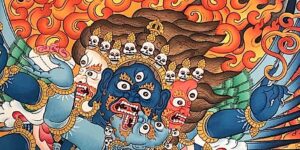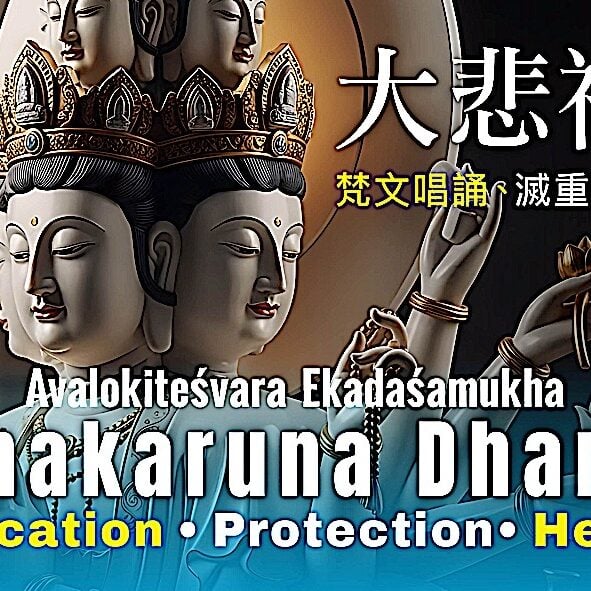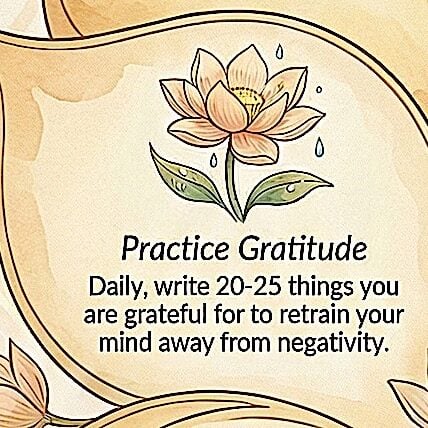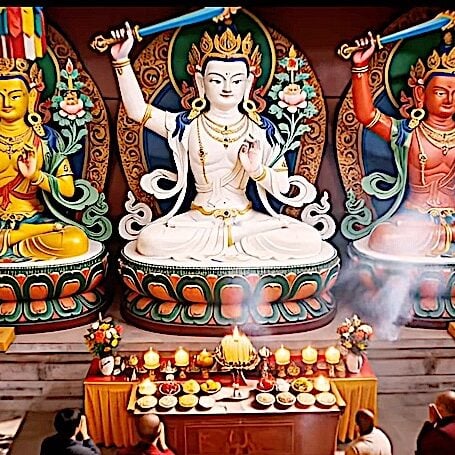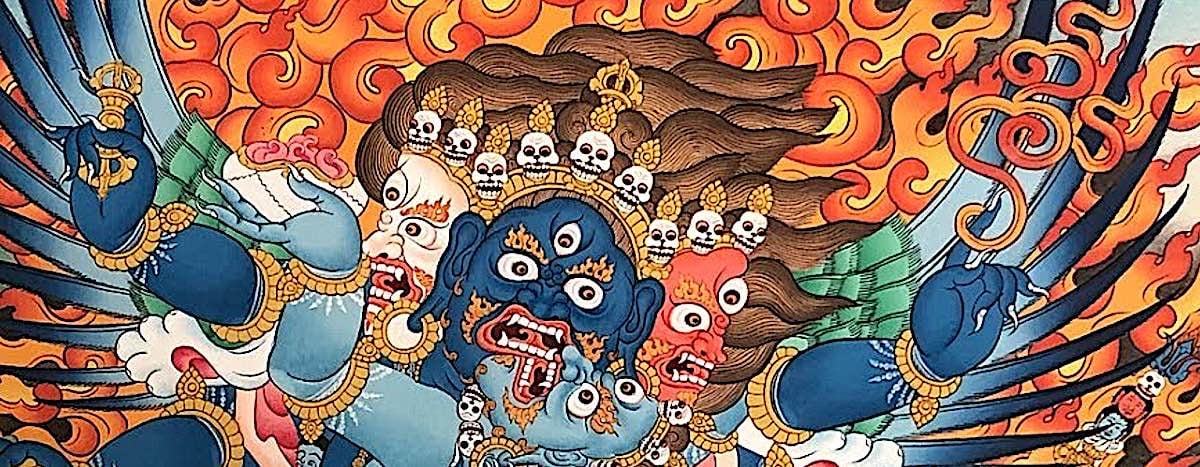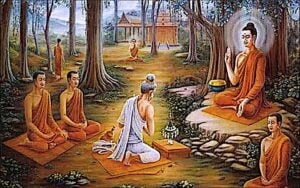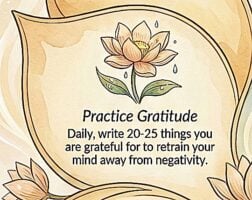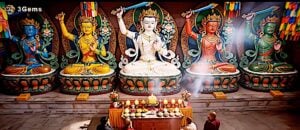Simhamukha Lion-Faced Dakini Mantra — Chant for Protection from Evil, Obstacles, Danger
Despite her wrathful, exotic form, Simhamukha, the Snow Lion-Faced-Dakini is a fully enlightened Wisdom Dakini and her mantra’s fourteen syllables avert all evils and obstacles. Here, Buddha Weekly chants the mantra in a fast, ferocious, powerful form, since it’s purpose is to avert negative forces, malicious thoughts, evil and threats. We present here with beautiful meditative images.
Lama Tsultrim of the Tara Mandala International Buddhist Community described Simhamukha “as a powerful remover of obstacles and as Queen of the Dakinis.”
Her mantra is considered the ultimate protection from evil, obstacles, negative karma, supernatural, black magic. This super wrathful emanation of Tara.
Generally, to chant her mantra, the main requirement, as always, is Bodhichitta and the intention to benefit all sentient beings. (Some suggestions on “volume” and chanting outloud below. This is not a mantra for chanting jouyously out loud.)
The mantra is:
ah ka sa ma ra cha sha dah rah sa mah rah yah phat
आह का सा मा रा त्सा शा दा रा सा मा रा या फट
༄། ཨ་ཀ་ས་མ་ར་ཙ་ཤ་ད་ར་ས་མ་ར་ཡ་ཕཊ་།།
FOR A DOCUMENTARY ON LION-FACED DAKINI and her mandala, see this exciting Buddha Weekly Documentary:
ART CREDIT: Some statue art is courtesy of the superb artisans at Terma Tree. https://www.termatree.com/products/simhamukha-dakini-1?_pos=4&_sid=15e44b504&_ss=r
MANTRA CHANTING OUTLOUD:
Mantra literally translates as “To think” (man means to think) and tra (to focus). The actual main purpose of mantras is to focus your mind — not to shout out commands. It is the mind that forms the intention (in Buddhism, the intention to benefit all sentient beings.) So, if you have the intention to benefit, there is no harm from Enlightened Mantras chanting any mantra (with Bodhichitta Intention, the wish to benefit all sentient beings.)
WORDS HAVE POWER! This mantra, for example, ends with the word “Phet” which means “cut” or “stop!” — like when you shout “cut it out!” to someone misbehaving (That can be harmful if we hurt their feelings. (Words and sounds have definite power to hurt!) So, here, with this mantra, don’t shout out Lion Faced Dakini just to anyone.
You’re basically telling them to “CUT IT OUT!” What are we telling them to cut? Specifically, we’re telling wicked demons, curses, malicious spirits and evil spirits to STOP IT!”
As a general principle, mantras are just as effective quietly recited or, if you’re accomplished, mentally (as long as you are actually mentally reciting, which is easier said than done if you’re in a panic (as could happen when you feel you need protection). But, most do it quietly.
The key thing here is intention. If we intend to benefit sentient beings, there should be no harm — but part of this intention is to not throw out potentially harmful sounds (like “shut up!” or “behave yourself!”) (Basically this mantra is a “behave yourself!” mantra, addressed at malicious forces (whether you view these as demons or as your own mind misbehaving!)
If in doubt, we chant silently. However, the mantras of Enlightened Beings, if chanted with Bodhichitta intention, are never harmful. So, when you speak of verbal verses mental recitation, usually the teachers suggest “quietly”. (It’s not about being harmful, but about disturbing others.)
The main exception to that is formal group practice, and especially name praise mantras, or praise Dharanis, where the purpose is to praise the activity of an Enlightened Deity (like Avalokiteshvara’s Dharani, or Tara’s 21 Praises in Sanskrit (which is a Dharani). In this case, the act of praise is highly meritorious, beneficial if heard by all beings. So, during formal practice, it is encouraged to be chant aloud (i.e. the same with Sutra chanting.)
Even peaceful mantras (for instance Medicine Buddha or White Tara), we generally we don’t shout them out, unless it’s a group practice where we want to feel the joyous energy of the entire group or Sangha.
More articles by this author
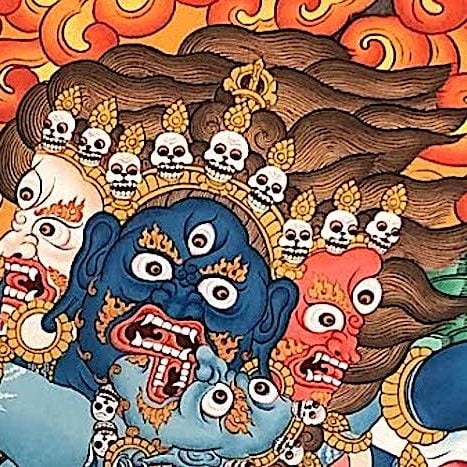
Vajrakilaya: put a peg in it ! — Cutting the three poisons with the sharpest weapon: destroying ignorance, greed, and hostility with profound Vajrakumara

SUPPORTING MEMBERS: Music Video- Amitabha Sukhavati Vyuha Dharani: Auspicious Mantra Purifies Karma 往生淨土神咒
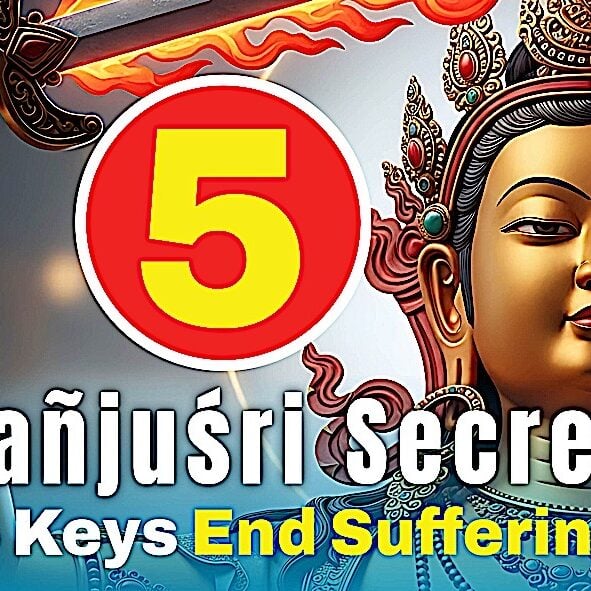
SUPPORTING MEMBER VIDEO: 5 Mañjuśri Secrets End the 5 Types of Suffering with 5 Wisdoms : Which Mañjuśri Are You?
Search
Latest Features
Please support the "Spread the Dharma" mission as one of our heroic Dharma Supporting Members, or with a one-time donation.
Please Help Support the “Spread the Dharma” Mission!

Be a part of the noble mission as a supporting member or a patron, or a volunteer contributor of content.
The power of Dharma to help sentient beings, in part, lies in ensuring access to Buddha’s precious Dharma — the mission of Buddha Weekly. We can’t do it without you!
A non-profit association since 2007, Buddha Weekly published many feature articles, videos, and, podcasts. Please consider supporting the mission to preserve and “Spread the Dharma." Your support as either a patron or a supporting member helps defray the high costs of producing quality Dharma content. Thank you! Learn more here, or become one of our super karma heroes on Patreon.
Lee Kane
Author | Buddha Weekly
Lee Kane is the editor of Buddha Weekly, since 2007. His main focuses as a writer are mindfulness techniques, meditation, Dharma and Sutra commentaries, Buddhist practices, international perspectives and traditions, Vajrayana, Mahayana, Zen. He also covers various events.
Lee also contributes as a writer to various other online magazines and blogs.




